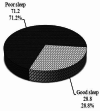Prevalence of Poor Sleep Quality Among Physicians During the COVID-19 Pandemic
- PMID: 33659109
- PMCID: PMC7920240
- DOI: 10.7759/cureus.12948
Prevalence of Poor Sleep Quality Among Physicians During the COVID-19 Pandemic
Abstract
Background: Sleep quality is influenced adversely or favorably by various intrinsic and extrinsic factors and sleep deprivation is a common problem facing doctors.
Objectives: To assess sleep quality among physicians during coronavirus disease 2019 (COVID-19) pandemic and correlate it with possible predictors.
Methods: This cross-sectional four-months study included a total of 344 physicians from different medical centers in the period between July 2020 and October 2020, during the COVID-19 pandemic. Physicians were aged between 24 and 60 years from different specialties. Data were collected using the Pittsburgh Sleep Quality Index (PSQI) questionnaire and Hospital Anxiety Depression Scale (HADS).
Results: Among our participant physicians there was poor sleep quality in 71.2%, while good sleep quality was present in 28.8%. There were significant correlations between poor sleep quality and the following parameters in the univariate logistic regression analysis: anxiety features (P value <0.001), depressive features (P value <0.001), and past history of COVID-19 (P value 0.003). However, multivariate logistic regression analysis showed that only the presence of anxiety features (P value <0.001) and depressive features (P value <0.001) could be used as significant independent predictor of poor sleep quality among physicians during COVID-19.
Conclusion: Presence of anxiety and or depressive features among physicians are the most significant independent predictors of poor sleep quality during the COVID-19 pandemic.
Keywords: anxiety; covid-19; depression; pandemic; physicians; sleep.
Copyright © 2021, Abdellah et al.
Conflict of interest statement
The authors have declared that no competing interests exist.
Figures



References
LinkOut - more resources
Full Text Sources
Other Literature Sources
Miscellaneous
